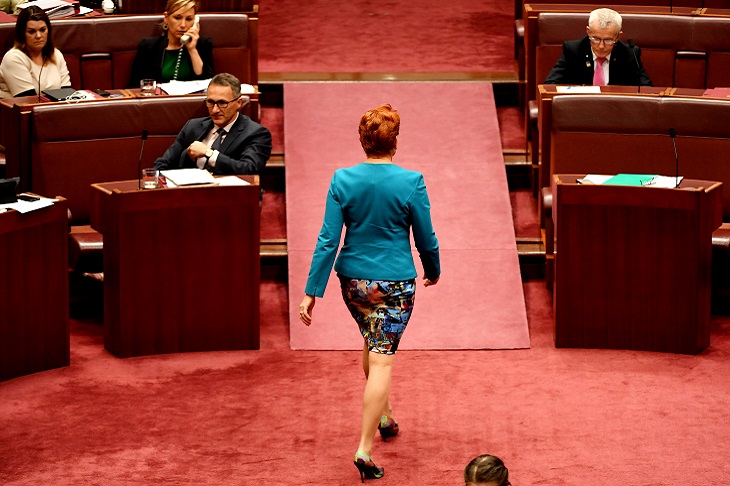Is there such a thing as right and wrong?
Well of course there is, and the fact that many university professors deny it in their classes doesn’t change that at all. As a very astute man once said: ‘The fact that we can’t tell which of two mountains, shrouded in cloud, is the tallest, doesn’t mean we can’t tell the difference between a mountain and a molehill.’
Why then do we have an electoral system in place for our Senate that encourages political differences with proportional representation (PR) voting rewarding molehills as if they are mountains?
Electoral contests following Federation were mostly between two major political parties which consolidated into Liberal and Labor, with a rural residue falling to either the Country (National) Party or Labor.
These days, electors facing a Senate ticket must choose between the three major political parties, another two or three wanna-be majors, and candidates from a plethora of minor parties who will be lucky if their own candidate votes for them. In addition, there are always a number of independents who each believes he holds the key to Australia’s success.
Each of these minorities appeals to a narrow interest that may be of fundamental importance to the candidate, but of minor significance to the rest of the country.
As the House of Representatives employs a preferential voting system, it has the effect, with only the occasional exception, of consolidating the results to the two majors. PR, however, has converted the Senate into a gold mine for independents and minor parties, with extensive calculations demonstrating where preferences need to be placed to milk the system and maximise chances of success.
PR allows candidates in multi-representative lists to accumulate votes from below that propel unrepresentative independents to a successful place in the list.
The left has always defended PR, arguing that it increases the diversity of opinion in decision making, allowing those whose views do not conform with the majority to be heard. That view, however, cancels the political debate between right and wrong by changing the debate to diversity, as if difference, itself, is good.
It also misses the very real politik of PR.
The Labor Party politician, Fred Daly, finished his political career in 1975 when the Whitlam government was dismissed. He had been in the House of Representatives since 1943 so it can be assumed that he knew a thing or two about Australian politics. Daly was old-school Labor, pro-trade union, pro-life, and anti-communist. He was well-liked by politicians from both sides of the House; his close friend in the Parliament being the long-serving Queensland Liberal member, Jim Killen.
Fred lamented that in all the time he had been in Parliament, the ALP had never had control of the Senate. The cause of this, he reported, was the PR voting system which had been introduced by Labor in 1948. Fred explains in his almost autobiographical book, From Curtin to Kerr, that the decision to change the Senate’s electoral system from preferential block voting to PR was made on the recommendation of Arthur Calwell, whom Daly reports as saying that with PR, the ALP will never lose control the Senate. As party leader, Calwell was never able to win a general election.
Daly notes, wryly, that after the introduction of PR, the ALP never again controlled the Senate and the likelihood of either major controlling the Senate is very slim.
We are now in a position to better understand the danger to a Parliament of a Senate controlled by independents and minors, such as we have suffered recently. The minors agree to support government policies in exchange for the government supporting some aspect of their pet interest, tree frogs, trans-pronouns, coal mines, vaccines, LGBTIQ+, etc.
By compelling a government to satisfy minor interests, PR elevates that interest above the much greater, numerically worthy interests of the Opposition. Bear in mind the purpose of the Senate under the Constitution was to represent the interests of the states.
Though the states as political entities have been largely emasculated by judicial review, a Senator’s purpose is to defend his state’s interests from government policies that might favour the major Australian population centres at the expense of the regions.
The power of Senators was dissipated by the practice of caucusing, which tied a Senator’s votes to the party room decisions. While caucusing cannot be prevented, the abolition of PR in Senate elections will make the election of minor groups and independents less likely, thus making it easier for we the people to recognise just who was in the right, who the wrong and hence who is responsible for the mess we are.
It will definitely help to secure majority rule, which can’t be wrong for a democracy, can it?
Got something to add? Join the discussion and comment below.
Get 10 issues for just $10
Subscribe to The Spectator Australia today for the next 10 magazine issues, plus full online access, for just $10.


























Comments
Don't miss out
Join the conversation with other Spectator Australia readers. Subscribe to leave a comment.
SUBSCRIBEAlready a subscriber? Log in